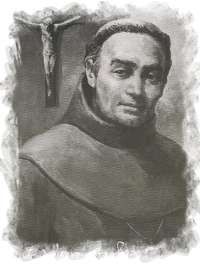CA Indian tribes’ opposition to Serra sainthood grows
by Chris Reed | July 24, 2015 8:29 am
 While Gov. Jerry Brown and other dignitaries are meeting with Pope Francis in Rome and at the Vatican this week to talk about climate change and other issues, the pope is under fire back in California.
While Gov. Jerry Brown and other dignitaries are meeting with Pope Francis in Rome and at the Vatican this week to talk about climate change and other issues, the pope is under fire back in California.
A growing number of Native American groups are objecting to the pope’s planned Sept. 23 canonization[1] in Washington D.C. of Father Junipero Serra on the grounds that Serra brought devastation to indigenous groups in California after founding nine Catholic missions here, beginning in San Diego in 1775. The protests are expected to intensify throughout the summer, and there are indications that Indian groups will seek support from progressive organizations in trying to make this a national issue.
The latest protest was held July 11 by the Amah Mutsun Tribal Band in the Mission San Bautista, which is northeast of Salinas. This account[2] is from the San Jose Mercury-News:
“The true history of what happened here has never been told,” tribal Chairman Valentin Lopez told a crowd of about 120 gathered on the grassy field across from the mission.
Serra’s Franciscan order “came up with an alibi that missions were a great place” where Native Americans were “taken care of like they were children” because they “wanted a better life,” Lopez said.
But that is a fiction, he said, “and you will hear words today that will tell the true story.”
That story, he said, includes the fact that more than 100,000 Native Americans died as a result of the trauma inflicted on them by the missionaries, a legacy of wounds that he said continues today.
Protest at Serra’s burial site
A larger, broader protest was held at the cemetery holding Serra’s grave in Carmel on April. 5. This is from the Monterey Herald[3]:
Led by the American Indian Movement, dozens of Native Americans from different tribes from all over California gathered on the Carmel Mission Cemetery for a ceremony to honor their ancestors and their history on one of the most sacred days in the Catholic calendar.
The timing and place was chosen because Junipero Serra, the Franciscan friar who founded the first nine of the 21 missions in the California system, is buried there. Pope Francis announced in January he would bestow sainthood onto the friar when he visits the United States later in the year.
A smaller protest was held Feb. 1 in downtown Los Angeles a week after the canonization plan was announced, the Los Angeles Times reported[4].
Hoisting a sign depicting Archbishop Jose Gomez with a toothbrush mustache and a swastika medallion, a dozen people gathered outside Sunday Mass at the Cathedral of Our Lady of the Angels downtown to protest the proposed canonization of Father Junipero Serra.
Olin Tezcatlipoca, director of the Mexica Movement, an indigenous-rights group, said Serra and the California mission system he founded were responsible for the Spanish “genocide” of native peoples. Gomez, who heads the Los Angeles Archdiocese and has called Serra one of his “spiritual heroes,” refused to meet to discuss the group’s objections, Tezcatlipoca said.
Governor tries to stay above fray
So far, Brown has chosen to try to keep his distance from the issue. In January, he told the Mercury-News, “Father Serra was a very courageous man and one of the innovators and pioneers of California. But there was horrible devastation of the native peoples.” The governor offered no criticism of the pope’s decision.
The argument of some Catholic leaders and defenders of Serra that it is wrong to judge an 18th-century man by 21st-century standards isn’t good enough for activists. “Didn’t they have the Ten Commandments then? Did they teach the golden rule?” one protester told an L.A. Times reporter.
The parallels with the current debate in California and nationally over whether schools and other government property should be named after Confederate leaders are plain.
Senate Bill 539, which would ban the naming of public facilities and roads after Confederates, passed its initial committee vote earlier this month with little opposition[5].
- canonization: http://www.nydailynews.com/news/national/pope-francis-canonize-california-missionary-article-1.2082675
- account: http://www.mercurynews.com/nation-world/ci_28469992/father-junipero-serras-sainthood-protested-at-mission-san
- Monterey Herald: http://www.montereyherald.com/social-affairs/20150405/native-americans-protest-canonization-of-junipero-serra-at-carmel-mission
- reported: http://www.latimes.com/local/lanow/la-me-ln-serra-canonization-20150201-story.html
- opposition: http://www.sacbee.com/news/politics-government/capitol-alert/article27222211.html
Source URL: https://calwatchdog.com/2015/07/24/ca-indian-tribes-opposition-serra-sainthood-grows/